Venezuela to Elect President: Opposition Stands No Chance
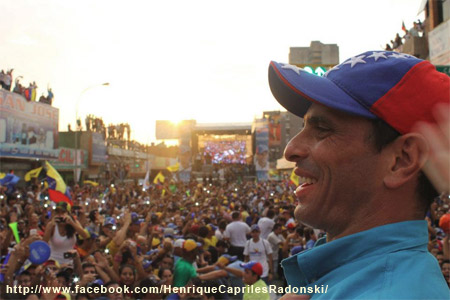
There was no bloodshed this time. Accompanied by a policeman, Vollmer approached the invaders to make precise what they wanted. As a result they were allowed to live on the territory of estate. There were houses built to accommodate the destitute, medical service was provided to all of them and a school constructed for their children. This experiment has become a unique case, an experience to be studied by economic think tanks of Latin America. The charismatic Vollmer, a German by origin, who appears to be loyal to the Bolivarian regime, has hit the lists of neo-liberal World Global leaders.
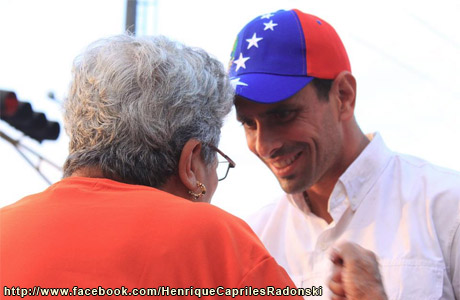
Vollmer was too independent to become a candidate. So those, who pull strings behind the curtains, have pushed him far aside giving way to docile Henrique Capriles Radonski, 40, a scion of a rich Jewish family. The family owns industrial enterprises, media outlets, and the lion’s share of entertainment business. His right-wing views are to large extent explained by his descent and the ties of his family to business partners in the United States and Israel… Back in school years Henrique joined the TFP (Tradition, Family, Property), a right-wing organization fighting Marxism and the Theology of Liberation and maintaining close ties to para-military extremists. Its leader, Alejandro Peсa Esclusa, had enormous influence on Henrique. He fully supported the Esclusa calls for violence against enemies. But Venezuela banned the organization in 1984 for being involved in the assassination attempt against John Paul II. The first thing Henrique did was to hide away the TFP flag he went to demonstrations with.
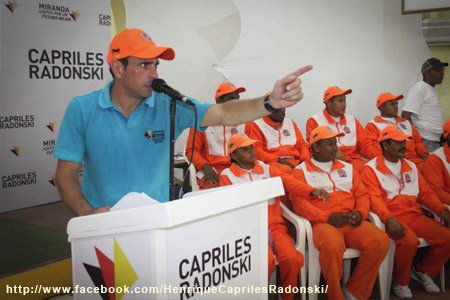
Upon getting a University degree, Capriles went into politics and became a Member of Parliament in 1998. In 2000 he was involved in creation of Primero Justicia, Justice First Movement (Movimiento Primero Justicia), a centre-right political party in Venezuela funded from the CIA funds. Since the very first days of its foundation, the Party was viewed as an instrument to fight Chavez policies. Heading the capital district of Baruta, Capriles led the witch hunt for Bolivarian government supporters and organized an attack against the Cuban embassy. Meeting German Sanchez, the Cuban ambassador, he demanded to provide access to each and every corner of the embassy building to make sure no top level chavistas found a refuge inside. Sanchez resolutely refused the ultimatum and warned the embassy staff was ready to offer resistance with all possible means at disposal. Capriles didn’t dare to storm, but the embassy was besieged, cut off from electricity, water, sewage, all cars with diplomatic vehicle registration plates were damaged. Capriles served a several months jail sentence for the crimes.
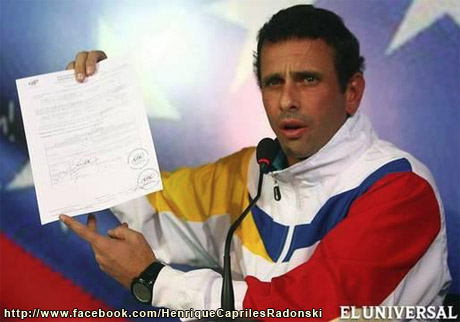
In July-October 2012 Capriles led the opposition at the presidential election. Chavez had grave health problems at the time having gone through several surgeries, chemical and radiotherapy. But he managed to bounce back and defeat the opponent leading with 55% of the votes against 44% for Capriles. Many Venezuelan political scholars think his grave illness was a conspiracy cancer caused by his enemies to disable him before the October election. It was supposed that Capriles had a good chance to win facing any other Bolivarian candidate for victory.
Venezuela journalist Ivana Cardinale is sure that Israeli intelligence was involved. The President sent away the ambassador of Israel and publicly cursed the Israeli state for killing hundreds of Lebanese. The strengthening of the relations between Venezuela and Palestine was perceived as unacceptable for Israel. It was viewed as a dangerous precedent to be followed by other Latin American states. The nationalization of gold and diamonds that previously had been under the control of Israeli entrepreneurs, evoked angry reaction on the part of Tel Aviv. Cardinale points out that Mossad and the CIA have many years’ experience of operations in Venezuela; they incite state coups, destabilize the country, and provide funds for opposition, anti-government journalists and protests staged by students. She says Capriles is a Jew pretending to be a Catholic and is a candidate supported by Mossad. According to her, Mossad agents acted as his guards at the last election.
Cardinale remembered the incident when a synagogue was ransacked in Caracas in 2009. Armed men broke into the building last week and daubed slogans including «Jews get out» on the walls before destroying religious objects. Rabbi's Personal Bodyguard and a group of policemen were involved. Cardinale admitted the possibility the policemen were paid to make Chavez supporters be blamed. She wondered if the attacks against synagogues in Caracas would continue to imitate anti-Jewish actions or Shimon Peres himself would later admit the Israeli involvement and confess Israel killed Chavez the same way Arafat had been murdered before.
It should be noted that Mossad agents had held top key positions in the structure of Venezuelan secret police before Chavez. Some of them left the country after the Chavez’s inauguration in February 1999; others resorted to the art of mimicry and continued their subversive activities. The investigation is on to prevent other cases of Bolivarian leaders falling prey to unexpected illnesses.
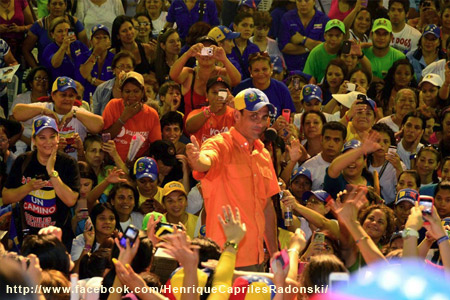
According to Hinterlaces poll conducted on April 4, there is Capriles has no chance to win the presidential election, if it were not for some «emergency factor». Oscar Schemel, head of Hinterlaces polling agency, said Nicolas Maduro has won ideological debates, because his allegiance to chavism gives him an advantage. 10 days to the election, slated for April 14, the polls give Maduro a 20% lead. According to Shemel, the absence of Chavez causes emotional instability among the chavistas ranks. Grass roots feel they are vulnerable having lost the leader who defended them, returned them their rights and made main participants of life mainstream so that they could realize they were citizens again. But it does not drive them to the wall but rather radicalizes chavism as a political movement.
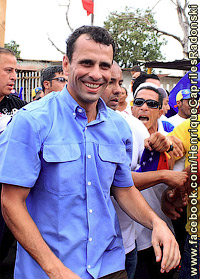 Having heard the news Capriles has intent to pull out of the fray in view of unavoidable defeat, Nicolas Maduro is calling on his opponent to continue the fight. According to Bolivarian media, Capriles had bought a $5 million apartment in Manhattan, New York. This kind of information disorients the opposition voters. Capriles has lost at least 5% of votes recently. But what is the most important thing – he is facing many clandestine opponents, especially in the ranks of traditional bourgeois parties - the Democratic Action (AD) and the Christian Democratic Party (COPEI). They are undermining his efforts.
Having heard the news Capriles has intent to pull out of the fray in view of unavoidable defeat, Nicolas Maduro is calling on his opponent to continue the fight. According to Bolivarian media, Capriles had bought a $5 million apartment in Manhattan, New York. This kind of information disorients the opposition voters. Capriles has lost at least 5% of votes recently. But what is the most important thing – he is facing many clandestine opponents, especially in the ranks of traditional bourgeois parties - the Democratic Action (AD) and the Christian Democratic Party (COPEI). They are undermining his efforts.
No matter what, the defining factor before the April 14 election is the mobilization resource of United Socialist Party of Venezuela (PSUV). The information coming from the cities Nicolas Maduro stopped in testifies to the fact that Hugo Chavez is able to win the battle for socialism, progress and people’s prosperity even after the death. In all the corners of the country people say «Chavez told us to win and we will do it at any price!»